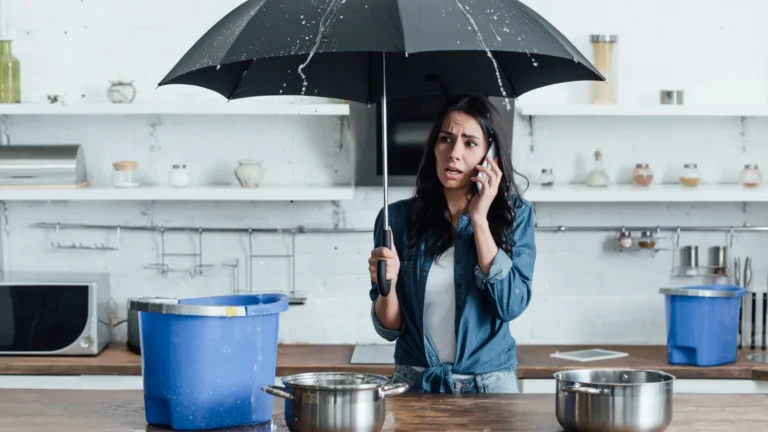Every homeowner and renter knows that even the best-maintained homes can throw a curveball now and then. Whether it’s a burst pipe, a kitchen fire or a sudden power outage, knowing how to handle common household emergencies can mean the difference between a minor annoyance and a big problem.
At RenovateDream.com, we believe preparation and quick action are your best tools. Here’s your go-to guide for the most common home emergencies, with practical steps, prevention tips, and when to call in the pros.
Water Leaks and Burst Pipes
Water leaks and burst pipes are the most common and damaging household emergencies. They can happen suddenly, especially in older homes or during freezing weather.
What to Do Immediately:
- Turn off the main water supply to stop the flow.
- Remove electrical appliances from the affected area to prevent electrical hazards.
- Open faucets to drain remaining water from the pipes.
- Place towels, buckets or pans to catch leaking water and minimise damage.
Prevention Tips:
- Check pipes for leaks or corrosion regularly.
- Insulate pipes in colder climates to prevent freezing.
- Know where your main water shut-off valve is and make sure everyone in your household does too.
When to Call a Professional:
If the leak is coming from inside the walls or you can’t stop the water, call a licensed plumber. They’ll assess the damage and fix it permanently.
Power Outages
Power outages can be caused by storms, blown fuses or electrical faults. Most are resolved quickly, but some can last for hours or even days.
What to Do Immediately:
- Check if the outage is just in your home or the neighbourhood.
- Unplug sensitive electronics to prevent damage from power surges when the power comes back on.
- Use flashlights, not candles, to reduce fire risk.
- Keep refrigerator and freezer doors closed to preserve food.
Prevention Tips:
- Keep a supply of batteries, flashlights, and a battery-operated radio in an easy-to-find location.
- Consider installing surge protectors for valuable electronics.
- Have a backup power source like a generator if you live in an area prone to outages.
When to Call a Professional:
If you think the outage is due to a blown fuse or faulty wiring in your home, call a licensed electrician.
Kitchen Fires
Kitchen fires, especially grease fires, are the leading cause of home emergencies. Quick thinking and calm action are key to preventing injury and property damage.
What to Do Immediately:
- For grease fires, never use water! Instead, smother the flames with a metal lid or baking soda.
- Turn off the stove or heat source if you can.
- Use a fire extinguisher rated for grease fires (Class K) if you have one.
- If the fire gets out of control, get out and call 911.
Prevention Tips:
- Never leave cooking unattended.
- Keep flammable items away from the stove.
- Install and test smoke detectors in the kitchen.
- Keep a fire extinguisher or fire blanket nearby.
When to Call a Professional:
After any fire, even a small one, have an electrician check your wiring and consider professional cleaning to remove smoke residue.
Clogged Toilets and Drains
Clogged toilets and drains are a pain, but can usually be handled without a pro—at least at first.
What to Do Immediately:
- Use a plunger to try to clear the blockage.
- For stubborn clogs, a chemical drain cleaner may help,p but use caution and follow the instructions.
- If water is overflowing, turn off the water supply valve behind the toilet.
Prevention Tips:
- Only flush toilet paper—never wipes, paper towels or hygiene products.
- Don’t pour grease or food scraps down the drain.
When to Call a Professional:
If you can’t clear the clog or think it’s a bigger issue, call a plumber. Persistent clogs may mean deeper plumbing problems.
Flooded Basements
Heavy rain, sump pump failure or burst pipes can cause a flooded basement—a nightmare for any homeowner.
What to Do Immediately:
- Don’t enter a flooded basement if the water may be near electrical outlets or appliances.
- If safe, turn off the electricity to the basement.
- Remove water with a pump, wet/dry vacuum or buckets.
- Dry the area thoroughly to prevent mould.
Prevention Tips:
- Install and maintain a sump pump.
- Make sure proper drainage around your home’s foundation.
- Seal cracks in basement walls and floors.
When to Call a Professional:
For major flooding, water damage or suspected mold.Carbon monoxide (CO) is a silent killer. Colorless and odorless. Most CO leaks come from faulty furnaces, water heaters or gas appliances.
What to Do Immediately:
- If your CO detector goes off, get out of the house.
- Call 911 from outside the home.
- Don’t go back in until authorities say it’s safe.
Prevention Tips:
- Install CO detectors on every level of your home.
- Have gas appliances and chimneys checked annually.
When to Call a Professional:
If you suspect a CO leak or your detector beeps, always call 911 and a qualified tech to check your appliances.
General Emergency Preparedness
Being prepared can save time, money, and even lives. Here’s how to handle common household emergencies better:
- Create an emergency plan with evacuation routes and meeting points.
- Keep an emergency kit with essentials: flashlights, batteries, first aid supplies, non-perishable foo,d and water.
- Make sure everyone in your household knows how to turn off water, gas, and electricity.
Conclusion: Be Prepared and Stay Safe
Emergencies are never fun, but knowing how to handle common household emergencies gives you confidence and control when the unexpected happens. Remember, quick action and a clear head can limit damage and keep your loved ones safe. Bookmark this from RenovateDream.com so you’re always ready for whatever your home throws your way – and don’t hesitate to call in the pros when it’s beyond your expertise. Be prepared, stay safe and keep your home the haven it’s meant to be.
